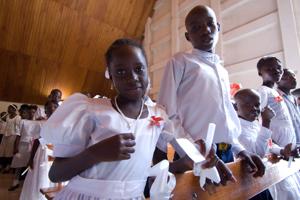
Caritas is helping flood victims in Haiti and has provided food rations to 20,000 people across six departments after several tropical storms caused flooding, landslides and sea surges.
Credits: Caritas
By David Snyder for CRS and Caritas staff
Like tens of thousands of those living in Gonaives, Haiti, Mertilus Jasmin spends most of his days knee deep in mud. Unlike most, however, he has a shovel in his hands, and is earning money to help dig the city out from the effects of Hurricane Ike.
“My friends heard about it and told me,” Jasmin said of the cash-for-work project Caritas members have launched in Gonaives. “I am almost finished cleaning my house. After I work here I go home and work there.”
Caritas is helping flood victims in Haiti and has provided food rations to 20,000 people across six departments after several tropical storms caused flooding, landslides and sea surges. Caritas is also distributing bottled water, hygiene kits, household items and providing temporary shelter to families affected by the floods. An emergency appeal for US$4.3 million has been launched to respond to immediate needs.
For the residents of Gonaives, mud has become a way of life. When Hurricane Ike passed over the island in early September, the third of three to hit the Caribbean in rapid succession, the region was pounded with rainfall. Falling steadily on the hillsides that surround the city – all of which have been completely stripped of trees in impoverished Haiti – the rain turned quickly to a flood, and with the water came hundreds of tons of mud. That mud – an estimated 2.5 million cubic meters of it – flowed down into Gonaives, completely inundating the city of 350,000 people.
For people like Jasmin, and virtually the entire population of the city, the effects were devastating. Thousands of homes were damaged or destroyed, and electricity has been cut off. Food and clean water have been in short supply for weeks.
“We do whatever we can to find food,” Jasmin said.
To help, Caritas has been providing family food kits to those affected by Ike. Each kit, containing such staples as rice, sugar, and cooking oil, was designed to provide a family of five with 15 days of food. To maximize the impact of the items, many kits were further divided to reach twice as many people with weekly rations.
But as the more immediate food needs were met, Caritas shifted its response to meeting the longer-term needs of Gonaives’ residents. Using cash-for-work projects, Caritas Haiti is providing employment opportunities for those most affected by the storm at a time when cash is critically needed. Teams of 15 members each are first formed from local community members, then provided with tools they can use to clean public buildings. Each worker is paid the equivalent of about $5 for every seven and half hour day, a good local wage that allows them to buy the items they need most.
“There is no more work anywhere else,” Jasmin said.
To have the most impact, Caritas is concentrating cash-for-work projects on schools. Once cleaned, these sites can once again function, bringing life back to a city that is struggling to regain its feet by ensuring that children do not miss classes as the clean up goes on for months to come. With little work available, most here were facing difficulties even before Hurricane Ike struck. For Jasmin, the work he has now means the chance to go back to school this fall, if the schools re-open on time.
“I’m a student,” Jasmin said. “I have lost my belongings so I will start by buying new school items. I lost everything.”
But the job ahead is challenging. Gonaives is buried beneath hundreds of tons of mud. Here at the Emmaus School, several feet of mud coat the compound, baking harder each day in the heat, and making removal more difficult. Knee deep in mud, Jasmin looks out over the schoolyard. A truck sits half buried beneath an overhang of tin sheeting, and at the far end of the yard another team battles the mud, shovel by shovel.
Standing side-by-side in the mud, I ask Jasmin how long it will take to clean the school, and how long it will be before Gonaives is back on its feet. He answers both with one simple sentence.
“I cannot tell how long it will take,” Jasmin said.
